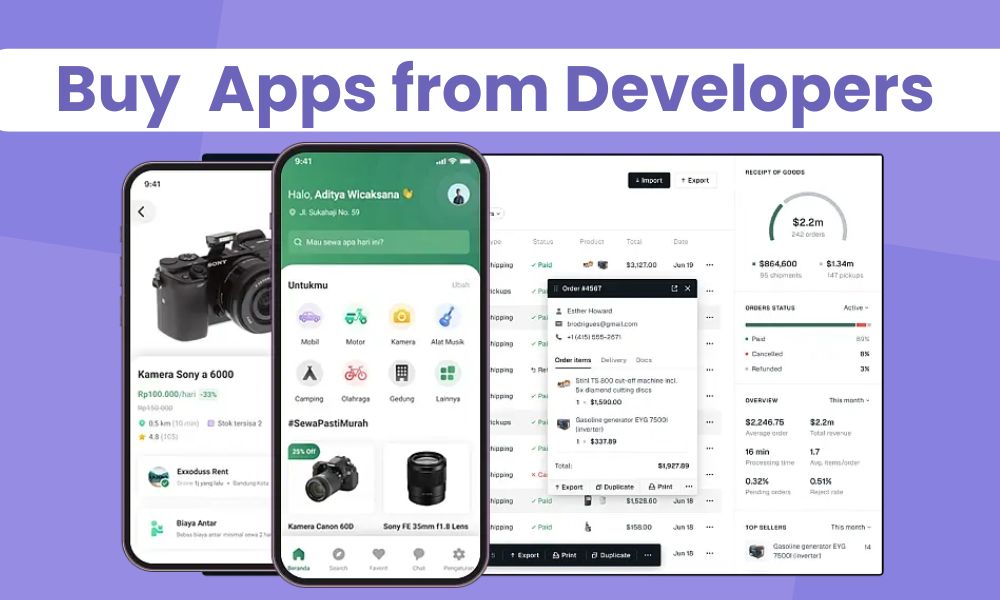Are you a business leader or decision-maker weighing strategic investments in mobile or web applications? You know the challenge—balancing speed, cost, quality, and flexibility when bringing a digital product to market. That’s why more organizations are turning to white label apps for sale and engaging an on demand app development company. Smart, efficient, and future-ready, these solutions enable you to buy whitelabel apps that align with your brand and scale seamlessly as your business grows.
This article cuts through the noise and empowers you to confidently assess whether pre-built app solutions are the right fit. You'll learn how apps on sale can accelerate deployment, reduce upfront development costs, and maintain control over your product’s identity and roadmap—all without compromising on quality.
Why Strategic Leaders Consider White Label Apps
Accelerate Time-to-Market
Speed matters. With white label apps for sale, you bypass months of coding and testing. The core product is market-proven—with a full feature set already built, debugged, and optimized. From there, your team focuses on branding, minor customizations, and deployment—launching in weeks instead of quarters.
Demonstrable Value and ROI
You want measurable impact, not promises. These apps come with success stories and documented user feedback. Instead of starting from scratch, you leverage existing performance data to predict ROI. It's easier to build internal buy-in when you can show clients or stakeholders a working model—not just mockups.
Cost Predictability and Efficiency
Traditional software development often carries hidden expenses and scope creep. Opting to buy whitelabel apps reduces variable costs. Licensing or one-time purchase models help maintain transparent budgets. Plus, ongoing maintenance and support are bundled, removing surprises from your P&L.
Customizable to Yours—Not Cookie-Cutter
Even though the base app is pre-built, flexibility remains. Most vendors allow white labeling throughout the UI, integrations via APIs, and optionally even custom feature modules. You retain brand identity and design consistency—without reinventing the wheel.
How to Choose the Right App — A Business-First Framework
1. Map Use Cases Before Browsing Options
Start with clarity. What business problem are you solving? Are you launching a marketplace, delivering services, managing logistics, or engaging customers? White label apps vary—from booking engines to e‑commerce storefronts. Match your objectives before reviewing options.
2. Evaluate Vendor Maturity & Track Record
Track record matters. Ask vendors for case studies aligned with your vertical. Electronic health record (EHR) apps, for instance, should come with HIPAA or GDPR compliance credentials. A on demand app development company that stands behind ongoing support is critical.
3. Test Flexibility with White Label Scope
Understand customization boundaries. Can you legally embed your branding? What UI elements are locked? Do integrations exist for your CRM, ERP, analytics, or identity platforms? Define these before signing.
4. Consider Long-Term Scalability
A robust codebase is not enough. You need performance at scale. Check whether the app uses microservices, supports load balancing, or can deploy to cloud platforms like AWS, Azure, or GCP. If you anticipate high usage, make sure the technical foundation is scalable.
5. Vet Ongoing Support & Upgrades
Software isn’t static. Security patches, operating system changes, and new feature updates matter. Clarify the vendor’s roadmap: how frequently are updates released? Is support 24/7? Is there a service-level agreement (SLA)?
When to Work with an On Demand App Development Company
Sometimes, you need more than a static white label product—you require flexible, line-extension ready solutions. That’s where partnering with an on demand app development company becomes strategic:
- For tailored add-ons: If your business requires niche workflows—such as gated onboarding, multi-currency billing, or custom reporting—you’ll need a development partner who can build or adapt modules easily.
- To integrate existing systems: If your company already runs legacy platforms, CRMs, or ERPs, an on-demand team can ensure smooth integration with the white label core.
- For company-branded support: Want to send everything through your name—from onboarding to customer service? A development agency can configure full white-label journeys: from app to user documentation and help support.
- To reuse across verticals: Perhaps you want to deploy similar app logic across different franchises or divisions (e.g., fitness centers, retail, or delivery). A flexible on-demand partner helps you reuse code and deploy multiple branded apps efficiently.
Steps to Buy Whitelabel Apps That Fit
Step 1: Build Your Business Requirements Document
Start with what matters: user personas, pain points, KPIs, Gantt timelines, and revenue models. Bring stakeholders together—IT, marketing, operations—to define absolute must-haves vs nice‑to‑haves.
Step 2: Shortlist with Relevance
Search for white label apps for sale focused on your industry. Compare not just features but architecture, integrations, and vendor quality.
Step 3: Secure Trials or Demos
Screen shortlist via hands‑on demos or trial usage. Use your branding during trials—change logos, colors, load your data—to gauge how seamless the process would be.
Step 4: Analyze Total Cost of Ownership
Go beyond sticker price. Include licensing/subscription, customization, integration, hosting, support, and upgrade costs. Divide by expected users or revenue impact to compute ROI.
Step 5: Formalize Contracts
Define terms: IP rights, update schedules, data ownership, SLAs, and exit clauses (e.g., exporting user data if you need to move platforms). Confirm white label permissions: legal branding, domain, privacy policies.
Step 6: Launch and Iteratively Optimize
Once you go live, treat this like a product launch. Gather feedback, measure user behavior, and plan app enhancements. If partnering with an on-demand team, schedule sprint cycles to iterate quickly.
Real-World Use Case: Scaling a Consumer Services Brand
A mid-size service provider wanted to launch a custom booking app across multiple cities. They avoided bespoke development and instead purchased a white-label booking platform and partnered with an on demand app development company to implement these customizations:
- Fully branded UI and onboarding workflows
- Integration with their internal CRM for bookings and notifications
- Multi-location architecture to manage city-specific operations
The result: the app launched in six weeks, cost 60% less than building from scratch, and generated a 4× ROI within six months—thanks to streamlined operations and improved customer satisfaction.
Conclusion
Adopting white label apps for sale isn’t just a tactical move—it’s a strategic advantage for businesses looking to scale fast without sacrificing quality or control. With reduced development time, predictable costs, and the ability to customize for your market, these solutions offer a clear path to digital transformation.
Whether you're launching a new venture, expanding your service offerings, or streamlining internal operations, white label platforms especially when paired with a trusted on demand app development company give you the tools to do it smarter and faster.
Success today hinges on speed and adaptability. By choosing to buy apps on sale, you position your business to meet market demand swiftly, stay agile in changing conditions, and grow without constantly rebuilding from the ground up. The technology’s ready—you just need to put your brand on it and lead it forward.


